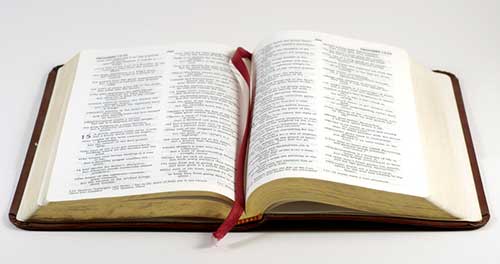
A recent tweet pointed me to a sociology masters thesis that reading the Bible regularly tends to make people more progressive.
Research shows that religion has the tendency to have a conservative influence upon those who are more highly religious, but using the 2007 Baylor Religion Survey, this study finds three different areas where reading the Bible has a liberalizing effect on the reader. The three domains where reading has a liberalizing effect deals with liberal morality issues, various criminal justice attitudes, and attitudes about the interaction between science and religion. This liberalizing effect is in opposition to the effect of Biblical literalism.
Thesis Abstract
Larry Eubanks, pastor of First Baptist Church of Frederick, Maryland, blogged about the phenomenon.
I would translate what he is saying into:
Do you take the Bible literally?
Or, do you take the Bible seriously?
Larry Eubanks highlights the phenomenon of “taking the Bible literally” (as opposed to taking it as literature and so being conscious of its style and background). Taking the Bible literally isn’t (OK, generalisations – this is a statistical study) about reading the Bible regularly. Taking the Bible literally is more about a declaration which gives people a sense of belonging to those who “take the Bible literally”. It has often been my experience that those who “take the Bible literally” don’t actually (for example, in their services) allow significant pieces of scripture to be read aloud without interjection by the pastor/preacher. Preachers in “taking-the-Bible-literally” churches will preach a sermon and use cherry-picked verses, ripped out of their context, to illustrate their predetermined theme. Or they will work through a passage piece by piece slowly, never allowing the scriptures to speak for themselves, but only allowing the congregants to receive them through their interpretation. And, note (including for lectionary deprecators), it is the preacher who determines, even in this second scenario, which pieces of scripture the congregants hear.
The study shows
Regular Bible Readers (RBRs from here on) believe that it is important to work toward social and economic justice in order to be a good person, as opposed to blaming the poor for their poverty and feeling that neither they nor society bears any responsibility.
Interestingly, the more often a person reads the Bible – from a few times a month to once a week to every day – the more strongly this position is held.
With regard to consumerism, RDRs feel that it is important to use and consume fewer natural resources, and, again, this grew the more frequently a person reads the Bible.
RDRs also tend to not support the death penalty and in general favor more humane treatment of prisoners.
And the more one reads the Bible, the less people see a conflict between the findings of science and the teachings of the Bible…
Those people who don’t [read the Bible regularly], even if they hold to orthodox beliefs about the Bible, get entrenched in certain ways of thinking they assume the Bible supports because they believe it is literal truth.
But it’s their ways of thinking and their positions on certain issues that become authoritative for their lives, not the Bible. And certainly not Jesus.
All evangelical Christians believe that the Bible is transformative, but when less than a quarter of them read it at least weekly, the real problem is that they don’t read it enough to truly make a difference.
In which case, what you believe about the Bible is irrelevant.
Why Regular Bible Readers Tend to Become More Progressive – Larry Eubanks
I appreciated the tweeted response to the tweet I began this post with, reminding me of Mark Twain:
It ain’t those parts of the Bible that I can’t understand that bother me, it is the parts that I do understand.
NB. The study is clearly USA based; I would love to see such studies in a wider context. It would also be fascinating to see this study repeated in the current, different USA context.



How interesting!
‘taking the Bible literally’ does seem a strange description to use when you have a Bible that includes, for a start, the Psalms. I don’t really know who uses it in that way, but it seems (from the frame of this work at least) some do.
Better to say, as noted here, ‘taking the bible seriously’.
And then to add ‘taking the Bible auhtoritatively’ (I don’t sit over it, but under it, as I sit under the God who stands behind it)
And then (above all?) ‘taking the Bible trustingly’ (not with a hermeneutic of scepticism that asumes I know better, but with a trust – how could you not have that when you see the One who is at the center of the Bible an the attitude he and his commissioned witnesses took to the OT?)
Oh yes, and ‘taking (or reading) the Bible regularly’.
God bless in Christ the Word, who comes to us above all through the word.